Life and achievements
Early life
Sappho was born in the year 630 BC on the island of Lesbos, which was one of the most culturally advanced regions in ancient Greece. It is presumed that her family was of noble origin, which would have enabled her to receive a good education and engage in artistic activities. Not much is known about her parents, but from ancient sources, she had three brothers. It is for this reason that her early life on Lesbos can be said to have significantly influenced her poetry.
Sappho was born on the island of Lesbos and was a young woman during the golden age of the island's cultural and social life. It was famous for poetry and music, which played a significant role in Sappho's growth as a poet. She would have received an education in playing the lyre and writing poetry, as these were considered noble accomplishments in her society. The social interactions and celebrations in Lesbos helped Sappho a lot in presenting her works and improving her writing skills.
In her early poems, Sappho mainly focused on the aspects of love, passion, and interpersonal relationships that are personal. Her style was very concrete, and she used simple language and a first-person point of view that gave the reader the feeling of being there. Such attributes made her poetry different from that of other ancient poets who wrote more formally and distantly.
Sappho's early adulthood was not without political turbulence. In about 600 BC, she was sent into exile in Sicily; it is believed that this was a result of the political instabilities that were prevalent in Lesbos. This period of exile affected her poetry because she wrote about her desire to return to her homeland and her thoughts on love and separation. Sappho did not let the difficulties of exile deter her from writing and reciting her poetry; thus, she became one of the greatest lyric poets.
Legacy
Sappho remains one of the most famous lyric poets of ancient Greece. Although her work is known only in fragments nowadays, it has significantly impacted ancient and modern literature. In ancient times, she was called the "Tenth Muse" and one of the Nine Lyric Poets, which speaks to her popularity among Greek poets.
Sappho's poetry is characterized by love, desire, and personal feelings, which have appealed to readers of different ages. This has made her work easily understood and relevant to this day. Sappho has also been deemed an essential figure in literature for analyzing gender and sexuality due to her portrayal of women's love and desire, including her love for other women.
Sappho did not merely confine her presence to the literary sphere only. The terms "sapphic" and "lesbian" are derived from her name and the island of Lesbos, thus underlining her link to female homosexuality. Her work has been received and re-received by different cultures and at various historical moments, and the ways of reading it have changed by changing perceptions of sexuality and gender.
Sappho's poetry remains popular among contemporary writers, poets, and artists. Her works have been translated into many languages, and thus, many people worldwide can enjoy her poetic writing. Finding new fragments of her poetry in the twentieth and twenty-first centuries has revived interest in her life and work and guaranteed her long-lasting impact.
Milestone moments
Feb 8, 630
Sappho is born.
Sappho was born on the island of Lesbos, which was a famous and historical place for art and culture. This environment nurtured her early passion for poetry and music, making her one of Greece's most famous lyric poets.
May 14, 600
Exile to Sicily
Sappho was sent into exile to Sicily, and this was most probably because of the political rivalry between her family and that of Lesbos. This period of exile influenced her poetry greatly. She conveyed the desire to be back home and the aspect of love and loss in her poetry with much passion and intensity.
Aug 14, 570
Sappho's death marked the end of an era for Greek lyric poetry. Though much of her work was lost over time, her influence persisted through the centuries, and her remaining fragments continued to inspire poets and writers.
Oct 16, 3
Late 2nd or Early 3rd Century AD Earliest Surviving Biography of Sappho
The earliest surviving biography of Sappho dates to this period, providing valuable insights into her life and work. This biography, along with mentions in other ancient texts, helps piece together the legacy of a poet whose work was largely lost to history.
